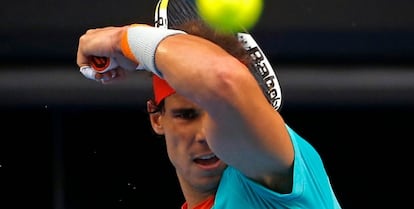Rafa Nadal: ¡°Having a rough patch makes you appreciate victories more¡±
It¡¯s been a roller-coaster ride of a year for the Spanish champion But he has refocused his mind on his game, and is looking forward to 2016


This year Rafa Nadal came up against an adversary who proved a more difficult challenge than any other he has faced over his career: himself. The 14-times grand slam champion¡¯s mind problems came to a head at the ATP semi-finals in London in November, when he crashed out to Novak Djokovic. EL PA?S caught up with Nadal in the dressing room afterwards to discuss how he intends to overcome his demons and return to form in 2016.
Question. It¡¯s been a difficult year, but you have still managed to make progress. Were you worried you wouldn¡¯t be able recover things?
Answer. I¡¯m a positive person, even when things aren¡¯t going well, and I always believe things can improve. It has been a difficult year, and it¡¯s been hard work, but I have worked to change things, and strangely enough, things have improved in the last half of the year, which in the past has been the most difficult period for me.
There comes a time when winning just becomes the norm, which isn¡¯t a good thing, because every win is important¡±
Q. You¡¯ve been through many ups and downs over the course of your career, what have they taught you?
A. I haven¡¯t learned much in terms of tennis this year, but mentally, I¡¯ve encountered new things, very different to the usual.
Q. You mean your so-called ¡°mental injury¡±?
A. In the end, all you can do is accept problems and try to work toward finding a solution. It¡¯s been difficult, and taken several months, but there comes a moment when you just have to tell yourself that you¡¯re going to play tennis, because I haven¡¯t forgotten how to. The problems haven¡¯t been to do with tennis, but with my mental game. And until you get that right, you can¡¯t play tennis well.

Q. Do you think the problems you¡¯ve had are to do with the fact that you¡¯re approaching 30?
A. I¡¯m not afraid. If I were, I wouldn¡¯t be afraid to say so, because I¡¯m not somebody who finds those kinds of things hard to accept. It¡¯s more like a lack of control: breathing, timing. When you lose control of your breathing and timing, when you don¡¯t know how the ball is going to bounce, it¡¯s because you¡¯re anxious. I suppose my injuries have also been a factor, and I am very demanding of myself. I¡¯ve talked about what¡¯s been happening honestly, about my feelings, and at the end of the day, I just tell myself that I am among the top five in the world, which can¡¯t be that bad.
Everybody gets tired of themselves at one time or another. But I will keep on doing what I do best¡±
Q. Have you found it hard to accept making mistakes?
A. I normally accept my mistakes. But this year, as I¡¯ve said, it¡¯s been about my mental game; I have found it hard to analyze things, to see things clearly. It isn¡¯t that I can¡¯t accept my mistakes, it¡¯s more that each mistake really worked against me: this year, each mistake led to three more mistakes. My mistakes have really eaten into my self-confidence, much more than usual.
Q. Perhaps the problem is that you are simply used to performing at an extraordinary level¡
A. It might look like that from outside, but not to me. I have always known how difficult this game is and I have always been aware of everything I have achieved. There comes a time when winning just becomes the norm, which isn¡¯t a good thing, because every win is important. Going through a rough patch makes you appreciate victories more, even if they are small wins. I¡¯m happy because the year has ended well. I just want to keep on working; I am very excited about the future, and have a good feeling about things.
Q. Would you say your confidence has taken a knocking?
A. Everybody loses their self-confidence at one time or another. You find yourself asking whether you¡¯ll ever play properly again. It¡¯s a possibility. But I was aware that the problem was psychological rather than about my ability. So I have battled on and won some small victories, overcoming the obstacles.
Nadal in numbers
- Number five in the ATP with 5,230 points.
- 23 tournaments: 61 victories and 20 defeats.
- Three titles: Buenos Aires, Stuttgart and Hamburg.
- Three finals: Basel, Beijing, and Madrid Masters.
PERFORMANCE IN THE GRAND SLAMS
- Quarter finals in Australia (6-2, 6-0 y 7-6 against Tomas Berdych).
- Quarter finals at Roland Garros (7-5, 6-3 y 6-1 against Novak Djokovic).
- 2nd round at Wimbledon (7-5, 3-6, 6-4 y 6-4 against Dustin Brown).
- 3rd round in New York (3-6, 4-6, 6-4, 6-3 y 6-4 against Fabio Fognini).
- Semifinals of the Masters Cup (double 6-3 with Djokovic).
KEY STATISTICS:
- 222 points from serve, and 166 double faults.
- 72% of points from first serve.- 55% of points from second serve.
- 62% of break points saved.
- 42% of break points converted.
Q. Do you feel that your fans have been supportive?
A. I feel people¡¯s affection and support. I¡¯m a family kind of person, and my friends are old friends. I know who my real friends are. I understand what it is people want from me. It¡¯s not about Rafa Nadal the person, it¡¯s about tennis. It¡¯s about what I have achieved in tennis and what I can still achieve. I may be special on court, but outside, I¡¯m just a normal guy.
Q. Do you ever get tired of being Rafa Nadal?
A. Everybody gets tired of themselves at one time or another. But I will keep on doing what I do best. I am very aware that I am extremely privileged.
Q. After losing at Wimbledon this year you said you would have to make some very important decisions in the coming years¡
A. What I meant was that the anxiety I felt at that time could lead me to stop enjoying playing tennis. If you¡¯re not happy playing then you should stop. Results are obviously important, but what really matters is enjoying the game, and I am still happy playing tennis.
Q. You¡¯ve been playing for many years now. Do you still find it satisfying?
A. It¡¯s monotonous playing the circuit, but I still enjoy it. I find it easier to travel than I did eight years ago. When I¡¯m at home in Mallorca, I have to make an effort to get back out there. I used to need to get back home between tours, but now I have learned how to find the space I need to enjoy myself wherever I am between games and tournaments.
Q. If you have children would you like them to be elite athletes, like their father?
A. Sport is a good traveling companion in life. It has all the right values: hard work on a daily basis, and the will to overcome difficulties. I love sport. I don¡¯t know what the future will bring, but if I have children, I¡¯d love them to grow up playing sport. It doesn¡¯t matter whether they are professionals or not, that depends on their ability and their motivation.
Q. You¡¯ve been living in the fast lane for many years now. Do you find the demands tiring?
A. I believe we should all be demanding of ourselves. When you give your utmost, then nobody can reproach you. I¡¯m a soccer fan, and when I see that my side loses, but that the players have given their all, I don¡¯t reproach them. Obviously, people are going to demand things of me, but I believe the important thing is to be self-critical and less critical of others.
Q. You¡¯ve managed to escape injury this year. How do you feel, and what¡¯s 2016 going to be like?
A. I¡¯m working harder than ever, especially on court, because my body can handle it. Physically, it¡¯s been an important year, because I¡¯ve had no injuries and have been able to play as often as I wanted. I feel like I¡¯m on good form.
I will continue to work with my uncle Toni for as long as the both of us want to. I don¡¯t believe that I should change just because a few things haven¡¯t gone well¡±
Q. Some commentators have suggested you need to stop working with your uncle Toni and find a coach that can help you win the big tournaments¡
A. I will continue to work with Toni for as long as the both of us want to. I don¡¯t believe that I should change just because a few things haven¡¯t gone well, especially after years of things going so well. As far as I am concerned, it¡¯s my fault that things haven¡¯t gone well, nobody else¡¯s. I have another coach, Francis Roig, and I think that he and Toni make a good combination. Toni knows me very well, he understands my game better than anybody.

Q. This year, Toni and Francis both accompanied you on your Asian tour. Will Francis be playing a bigger role from now on?
A. Francis has always come with me to Beijing and Shanghai, but this year Toni came along. We had two very good weeks¡¯ work that we all enjoyed. I work very well with both of them and get on well. We may repeat the experience more often from now on.
Q. You didn¡¯t play in the 2012 Olympic Games. Are you motivated to try for Rio in 2016?
A. The first thing I need to do is classify. Playing in the Olympic Games is a very special experience, obviously, and I am very motivated to return to playing in the Olympics.
Tu suscripci¨®n se est¨¢ usando en otro dispositivo
?Quieres a?adir otro usuario a tu suscripci¨®n?
Si contin¨²as leyendo en este dispositivo, no se podr¨¢ leer en el otro.
FlechaTu suscripci¨®n se est¨¢ usando en otro dispositivo y solo puedes acceder a EL PA?S desde un dispositivo a la vez.
Si quieres compartir tu cuenta, cambia tu suscripci¨®n a la modalidad Premium, as¨ª podr¨¢s a?adir otro usuario. Cada uno acceder¨¢ con su propia cuenta de email, lo que os permitir¨¢ personalizar vuestra experiencia en EL PA?S.
?Tienes una suscripci¨®n de empresa? Accede aqu¨ª para contratar m¨¢s cuentas.
En el caso de no saber qui¨¦n est¨¢ usando tu cuenta, te recomendamos cambiar tu contrase?a aqu¨ª.
Si decides continuar compartiendo tu cuenta, este mensaje se mostrar¨¢ en tu dispositivo y en el de la otra persona que est¨¢ usando tu cuenta de forma indefinida, afectando a tu experiencia de lectura. Puedes consultar aqu¨ª los t¨¦rminos y condiciones de la suscripci¨®n digital.








































